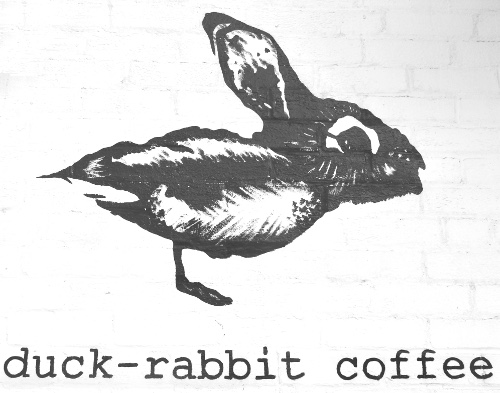
At first glance, duck-rabbit coffee on Columbus Road in Cleveland may seem like just another hip, coffee shop, but this would be a short-sighted viewpoint. In fact, you need to take many different factors into context as the German philosopher Ludwig Wittgenstein suggests. What may seem like a rabbit, may actually be a duck.
Extending his hand to welcome us, Cal Verga, the owner of duck-rabbit, offered us a coffee and steered us over to a tall counter bar where we could talk. After learning that Cal got into coffee when living in the Bay Area, the first question immediately came to mind. Why Cleveland?

“I grew up in Cleveland.” After getting his degree and starting grad school in San Francisco, Cal decided the life of a student wasn’t for him. “I had a passion for coffee and I was feeling more entrepreneurial.” Cleveland, an emerging hub for craft artisans, seemed like the perfect place for Cal to introduce locals to craft coffee.
Closing his philosophy books, Cal returned to the Cleveland area and opened duck-rabbit coffee (capitals excluded on purpose). But as I mentioned, it’s not just a coffee house and even to say it’s a coffee roastery doesn’t give it justice either. What seems like a duck, could also be a rabbit.
“We try to help people see coffee as an object of refined taste.” duck-rabbit stands behind a “clean cup”. As Cal explained, a “clean cup” involves the whole technique of making the perfect cup of Joe.

The first step in the process is in properly sourcing the beans. “It’s important to source the best beans.” It turns out that most commercial coffee is sourced from large farms throughout the world. These large farms push out the smaller farmers to more remote, often elevated, locations where they are able to farm amazingly rich beans. Unfortunately, their location gives them limited access to the buying market. This is where green coffee importers step in. They find these small farmers on the mountainside, try their beans, agree on certain growing practices, and in turn offer them a premium price for their coffee and an avenue for revenue. “It’s all very hands-on.”
The next step in a “clean cup” is roasting the beans. “You want to roast the beans in a way to highlight, but not overtake their origin.” duck-rabbit roasts their coffee beans from a vintage roaster that they imported from Germany. They were actually able to find the company that made the roaster and had them refurbish it before shipping it to the states. Pretty cool, right?

The last step and one that is often overlooked is the proper way to brew the roasted coffee beans. There is a science to brewing a clean cup. Customers find that duck-rabbit’s method is hard to replicate outside of the coffee house. Cal prefers the “pour-over” method, using one of many different pour-over devices they have in their coffee house.

To demonstrate, he grabbed a filter, placed it in the pour-over and poured the ground, roasted beans into the filter. He grabbed a pot of piping hot, filtered water and slowly poured it over the beans, creating the perfect cup of coffee. A true “clean cup”.
Taking all of these factors into context, and then tasting the warm, steaming, flavorful Guatemalan Morales coffee (which Cal named after the family that farmed the bean), you get a real sense of duck-rabbit craft coffee.
duck-rabbit coffee is located at:
2135 Columbus Rd., Suite B
Cleveland, OH 44113
I highly recommend making your way over there. duck-rabbit roasted coffee is also available at select cafe’s in Lakewood and throughout Cleveland.
New to Nearly All Things? Follow us on Facebook & Instagram to find out more cool things to do, drink, eat, and wear. And, if you like duck-rabbit and/or this article share it with your friends because sharing is caring 🙂